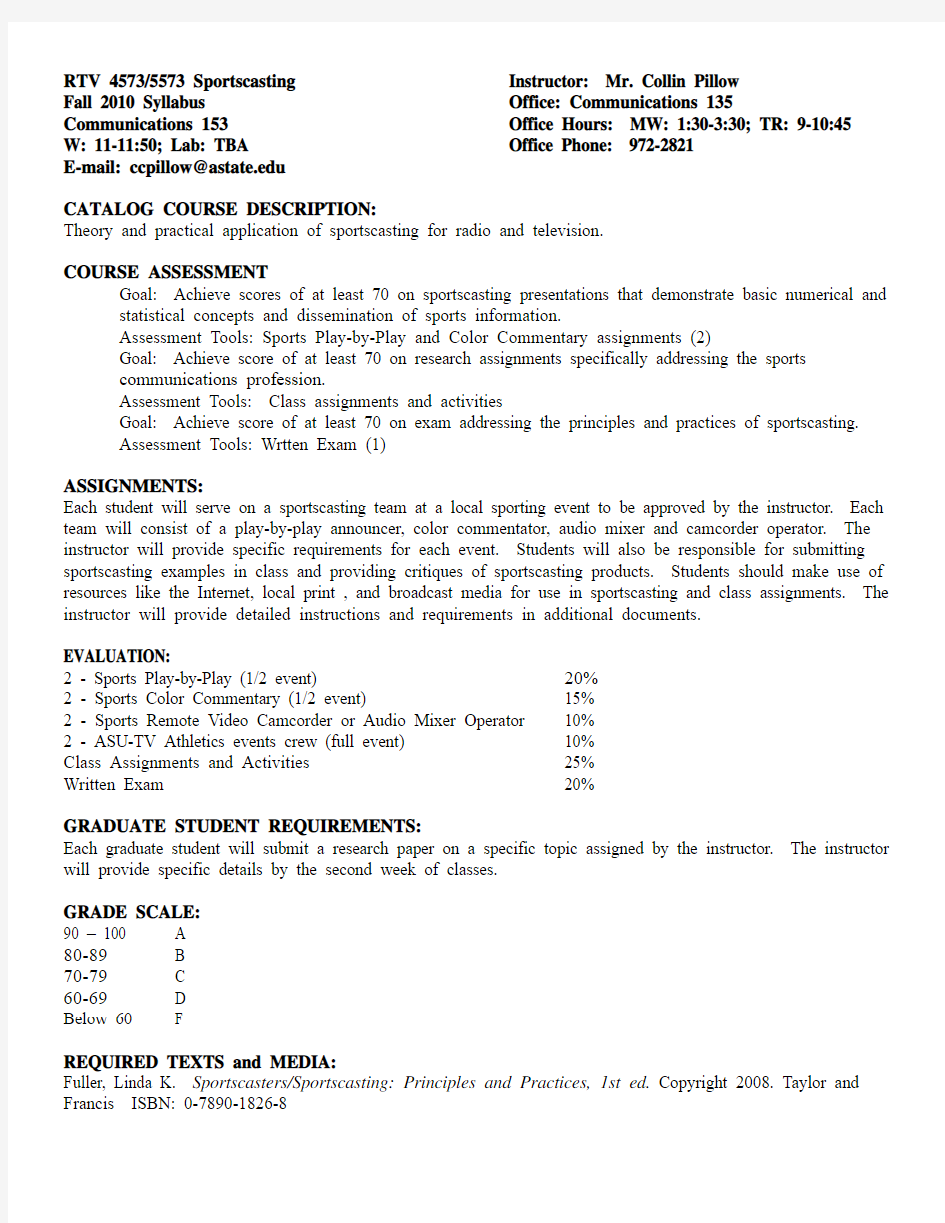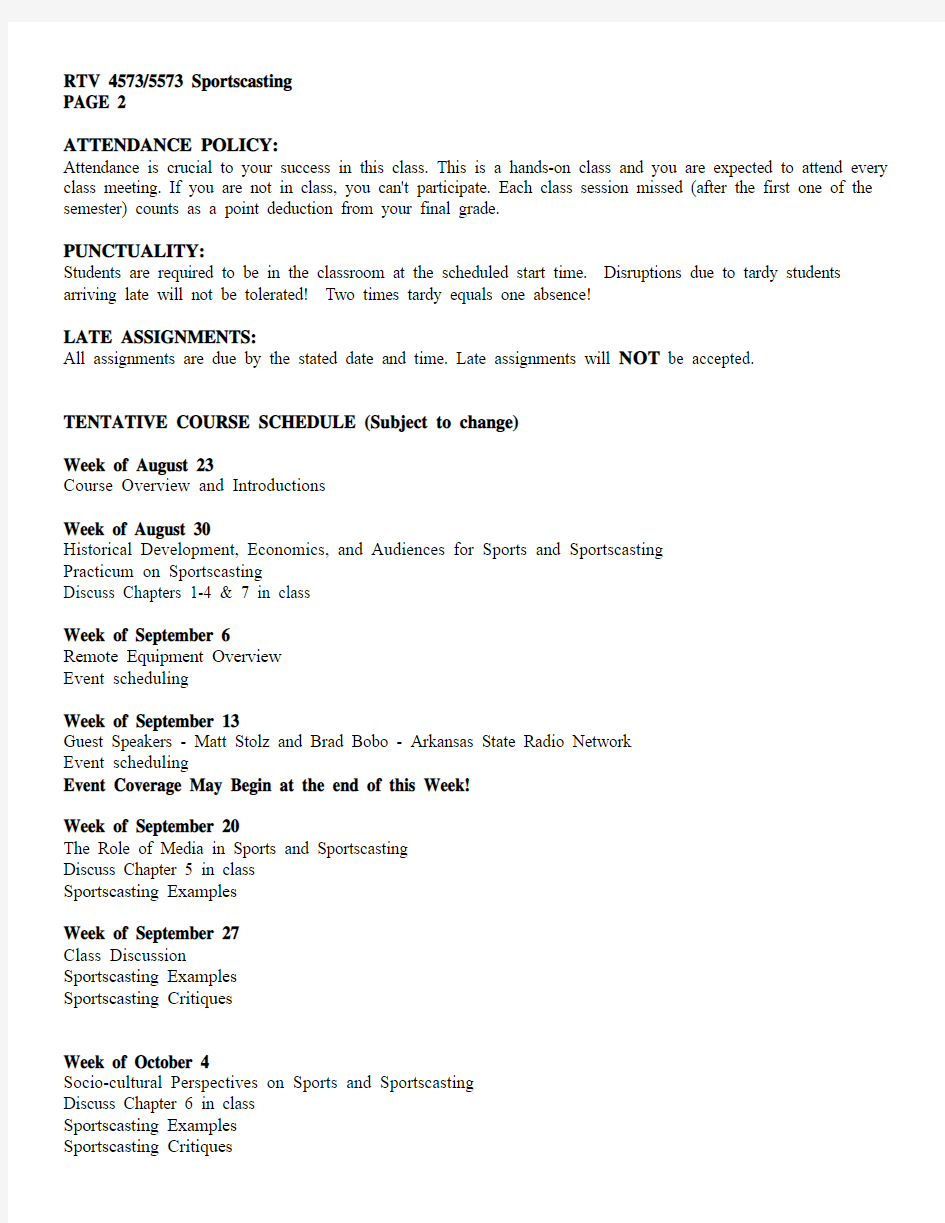Sportcasting


RTV 4573/5573 Sportscasting Instructor: Mr. Collin Pillow
Fall 2010 Syllabus Office: Communications 135 Communications 153 Office Hours: MW: 1:30-3:30; TR: 9-10:45 W: 11-11:50; Lab: TBA Office Phone: 972-2821
E-mail: ccpillow@https://www.sodocs.net/doc/1e2183808.html,
CATALOG COURSE DESCRIPTION:
Theory and practical application of sportscasting for radio and television.
COURSE ASSESSMENT
Goal: Achieve scores of at least 70 on sportscasting presentations that demonstrate basic numerical and statistical concepts and dissemination of sports information.
Assessment Tools: Sports Play-by-Play and Color Commentary assignments (2)
Goal: Achieve score of at least 70 on research assignments specifically addressing the sports
communications profession.
Assessment Tools: Class assignments and activities
Goal: Achieve score of at least 70 on exam addressing the principles and practices of sportscasting.
Assessment Tools: Wrtten Exam (1)
ASSIGNMENTS:
Each student will serve on a sportscasting team at a local sporting event to be approved by the instructor. Each team will consist of a play-by-play announcer, color commentator, audio mixer and camcorder operator. The instructor will provide specific requirements for each event. Students will also be responsible for submitting sportscasting examples in class and providing critiques of sportscasting products. Students should make use of resources like the Internet, local print , and broadcast media for use in sportscasting and class assignments. The instructor will provide detailed instructions and requirements in additional documents.
EVALUATION:
2 - Sports Play-by-Play (1/2 event) 20%
2 - Sports Color Commentary (1/2 event) 15%
2 - Sports Remote Video Camcorder or Audio Mixer Operator 10%
2 - ASU-TV Athletics events crew (full event) 10%
Class Assignments and Activities 25%
Written Exam 20%
GRADUATE STUDENT REQUIREMENTS:
Each graduate student will submit a research paper on a specific topic assigned by the instructor. The instructor will provide specific details by the second week of classes.
GRADE SCALE:
90 – 100 A
80-89 B
70-79 C
60-69 D
Below 60 F
REQUIRED TEXTS and MEDIA:
Fuller, Linda K. Sportscasters/Sportscasting: Principles and Practices, 1st ed. Copyright 2008. Taylor and Francis ISBN: 0-7890-1826-8
ATTENDANCE POLICY:
Attendance is crucial to your success in this class. This is a hands-on class and you are expected to attend every class meeting. If you are not in class, you can't participate. Each class session missed (after the first one of the semester) counts as a point deduction from your final grade.
PUNCTUALITY:
Students are required to be in the classroom at the scheduled start time. Disruptions due to tardy students arriving late will not be tolerated! Two times tardy equals one absence!
LATE ASSIGNMENTS:
All assignments are due by the stated date and time. Late assignments will NOT be accepted.
TENTATIVE COURSE SCHEDULE (Subject to change)
Week of August 23
Course Overview and Introductions
Week of August 30
Historical Development, Economics, and Audiences for Sports and Sportscasting
Practicum on Sportscasting
Discuss Chapters 1-4 & 7 in class
Week of September 6
Remote Equipment Overview
Event scheduling
Week of September 13
Guest Speakers - Matt Stolz and Brad Bobo - Arkansas State Radio Network
Event scheduling
Event Coverage May Begin at the end of this Week!
Week of September 20
The Role of Media in Sports and Sportscasting
Discuss Chapter 5 in class
Sportscasting Examples
Week of September 27
Class Discussion
Sportscasting Examples
Sportscasting Critiques
Week of October 4
Socio-cultural Perspectives on Sports and Sportscasting
Discuss Chapter 6 in class
Sportscasting Examples
Sportscasting Critiques
Week of October 11
Guest Speaker – To be announced.
Week of October 18
Future Concerns and Considerations about Sports and Sportscasting
Discuss Chapter 8 in class
Week of October 25
Class Discussion
Sportscasting Examples
Sportscasting Critiques
Week of November 1
Guest Speaker(s): ASU Sports Information Department Staff
Week of November 8
Class Discussion
Sportscasting Critiques
Week of November 15
Class Discussion
Sportscasting Critiques
Week of November 22
FALL BREAK – No classes this week.
Week of November 29
Class Discussion
Sportscasting Critiques
Graduate Paper Due in Class This Week
Week of December 6
Final Exam on Wednesday, Dec. 8 @ 12:30
UNIVERSITY POLICY ON HAZARDOUS CHEMICALS OR EQUIPMENT
This course may require the use of hazardous chemicals or equipment that the University Safety Committee recognizes as potentially hazardous to a student's safety and health. Every instructor is required to provide instructional information and training on safe handling and usage procedures prior to engaging students in the use of hazardous chemicals or equipment.
In addition, students are advised to notify the instructor or laboratory supervisor of any medications or conditions that may impair their mental alertness and/or their ability to safely engage in the use of any hazardous chemical or equipment. All students should participate in the use of hazardous chemicals and equipment only under the direct supervision of the instructor or by approval of the instructor, using recommended methods and procedures.
Failure to adhere to the outlined safety precautions could result in disciplinary action.
RTV 4573/5573 Sportscasting
PAGE 4
DISABILITY ISSUES
Any student in this course who has a disability that may prevent him/her from fully participating in this course should contact the Disability Services Office (972-3964) as soon as possible so we can make the necessary accommodations to facilitate your educational opportunity.
CELL PHONES AND PAGERS:
In order for class to be a positive learning environment, distractions should be kept to a minimum. All cellular phones and pagers should be turned off or on silent (vibrate) mode. The first time a cell pho ne or pager rings in class the instructor will begin requiring all devices be placed at the front desk/table until the class has concluded. Students who fail to participate in this requirement will be asked to leave the room for the remainder of that class session.
EQUIPMENT TREATMENT:
Each student is responsible for proper treatment of departmental equipment. A student will lose all equipment access if he/she does not treat the equipment responsibly, if she/he fails to return equipment in a timely manne r or breaks equipment. Student grades will be impacted by not following checkout procedures and fines will be imposed for failure to return equipment on time. Equipment check out procedures must be adhered to if all students are to have equal access. It is the student's responsibility to notify the instructor and/or department engineers of any mechanical difficulties associated with departmental equipment.
Check your e-mail often because the instructor may communicate with class members outside of the normal class meeting day/time.
The Reservation Process
1. Online reservations are confirmed in accordance with the reservation policy. According to policy, online requests must be submitted at least two working days in advance of the requested checkout.
2. A second type of reservation is available at the service counter. GA workers will also provide reservation tags upon request.
3. Due to limited equipment resources, the process creates three levels of checkout availability. Confirmed reservations outrank unconfirmed reservations, which outrank regular checkouts. To date, we have successfully filled all confirmed reservations.
4. There is an obvious benefit to both types of reservations. However, failure to pick up the reserved equipment on schedule triggers an infraction fine. The reservation process encourages responsibility in equipment use.
5. GA workers place the reservation tags into the appropriate bin upon receipt, (per the posted instr uctions).
6. GA workers remove tags from the weekday bin and attach securely to the reserved equipment 24 hours prior to the reservation time (per the posted instructions). According to policy and procedures, they remove tags from equipment not picked up, and email the infraction notice.
ACADEMIC INTEGRITY POLICY
College of Communications
Arkansas State University
1. ACADEMIC INTEGRITY
a. Academic integrity calls for students to do their own work and not to claim as their work anything someone
else has done. Intellectual growth calls for doing one's own work; so does academic honesty.
b. Infringement of academic integrity includes offering someone else's work as your own (see Plagiarism),
buying term papers and cheating (see below). Specific penalties may result.
2. PLAGIARISM
a. Plagiarism is giving the impression in an assigned paper that someone else's thoughts; ideas and/or words
are your own.
b.To avoid plagiarism, give written credit and acknowledgment to the source of the thought, idea and/or
words, whether you have used direct quotation, paraphrasing or just a reference to a general idea.
c. If you directly quote works written by someone else (i.e., use some or all of the exact words of the author),
enclose the quotation in quotation marks and provide a footnote or endnote. In case of news articles,
enclose quotes in quotation marks and attribute them.
d. No term paper, book report, project or class assignment written for credit in one class may be used for
credit in another class without the knowledge and permission of all professors concerned.
e. The research, as well as the complete written paper, must be the work of the person seeking academic
credit for the course.
3. Faculty members may respond to a case of plagiarism in any of the following ways
a. Return the paper for rewriting; the grade may be reduced.
b. Give a failing grade on the paper--"F" if a letter grade is used or zero if numerical grading is used.
c. Give the student a failing grade in the course.
d.Recommend sanctions, including disciplinary expulsion from the University. (See the current edition of the
Student Handbook for procedural details.)
4. TEST CHEATING may consist of the following:
a. Having access to exam questions beforehand.
b. Having access to course information during an exam period.
c. Observing another person's test during the exam perio
d.
5. Faculty members may:
a. Seize the test of the offending student; or
b. Allow the testing to progress without interruption, informing the offending student at the end of the period
about the offense.
c. Inform the student within a reasonable length of time about the offense and its consequences.
6. Faculty members may respond to a case of cheating in any of the following ways
a. Give a failing grade on the exam--"F" or zero.
b. Give a failing grade in the course.
c. Refer the matter for disciplinary action to the Office of Student Affairs.
7. SCOPE: These policies cover all classes in the College of Communications.
